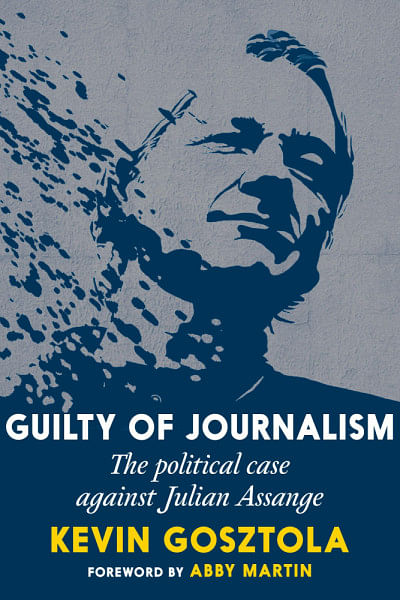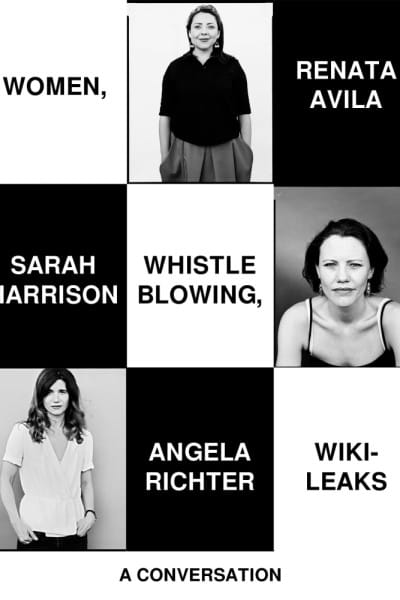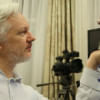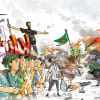3 essential reads on Julian Assange’s impact on journalism

The WikiLeaks founder, Julian Assange, was recently declared a free man after signing a plea deal with the US. Following a 14-year legal battle, which included five years in London's Belmarsh Prison, he was finally permitted to return to his native country, Australia.
Assange's US lawyer, Barry Pollack, shared after the hearing how Assange had "suffered tremendously in his fight for free speech and freedom of the press".
The Assange saga has spanned more than a decade. With news of his newfound freedom making headlines, many may struggle to recall the original charges against him and the debates he sparked on free speech and journalistic practices.
Assange's US lawyer, Barry Pollack, shared after the hearing how Assange had "suffered tremendously in his fight for free speech and freedom of the press".
As I myself delved into the literature to learn more about this man, I've compiled three books that summarise the proceedings as well as providing a broader perspective on how Assange revolutionised journalism.
Guilty of Journalism: The Political Case Against Julian Assange (Seven Stories Press and Censored Press, 2023)
Kevin Gosztola

Written by independent journalist Kevin Gosztola, who has dedicated his career to covering WikiLeaks and whistleblower stories, this book extensively documents the US government's case against Julian Assange, highlighting its grave implications for press freedom. The charges against Assange span a decade, and the book serves as an essential guide to understanding all trial proceedings and what the charges really entail.
In addition, Gosztola critiques the mainstream media's focus on Assange's personal life rather than the broader issues at hand, including WikiLeaks' revelations about US war activities and the unprecedented legal actions against Assange as a publisher. Drawing on testimony from dozens of witnesses, the author exposes abuses by the CIA and FBI, providing a comprehensive perspective on what has been dubbed the trial of the century. This is a great starter book for anyone looking to grasp the complex narrative surrounding Assange and understanding the wider implications of the ongoing struggle for whistleblowers and investigative journalism.
Secret Power: WikiLeaks and Its Enemies (Pluto Press, 2022)
Stefania Maurizi

"Julian Assange and his organisation were undoubtedly pioneers," Maurizi declares in the book. Before WikiLeaks launched in 2006, no major newspaper routinely used encryption to shield the identities of their sources. It wasn't until years later, influenced by WikiLeaks' approach, that even the most prestigious publications, like the New York Times, began offering this kind of protection. In this book, Maurizi discusses how WikiLeaks pioneered the use of cryptography and the internet to bypass censorship and leak information. At its core, the book is a passionate defence of WikiLeaks and Julian Assange, arguing that they are being persecuted by a powerful group Maurizi calls the "secret power"—a web of intelligence agencies, militaries, and diplomats. This group, she argues, fears the transparency that WikiLeaks brings by publishing classified documents.
As an investigative journalist, Maurizi details her work with WikiLeaks, including covering and investigating leaks such as the "Afghan War Logs", "Gitmo Files", and "Cablegate". These leaks exposed information on the US treatment of detainees and civilian casualties in Iraq and Afghanistan. The book also details Maurizi's seven-year legal battle to gain access to information on the sexual assault allegations against Assange, which she believes were a tactic to discredit him.
Overall, this book provides a comprehensive overview of how WikiLeaks revolutionised the world of journalism.
Women, Whistleblowing, WikiLeaks: A Conversation (OR Books, 2017)
Renata Avila, Sarah Harrison, and Angela Richter

The very last book in this list is not necessarily about Assange himself but sheds light on conversations often left out when discussing Assange's impact on journalism. It discusses how women are underrepresented and marginalised in media narratives around whistleblowing and digital activism. The book focuses on how women, such as Chelsea Manning and Sarah Harrison, have made major contributions to the whistleblower community while experiencing more hurdles and earning less recognition than their male counterparts. This collaborative book is structured as a conversation between the three authors: Renata Avila, a Guatemalan human rights lawyer; Sarah Harrison, a British journalist and WikiLeaks editor; and Angela Richter, an activist and author.
The book provides a fresh perspective on this much-discussed topic through the inclusion of personal accounts from the authors, who have been deeply involved in the narrative surrounding Assange from the beginning. Sarah Harrison recounts her rescue mission for Edward Snowden after his announcement that he was the NSA whistleblower, while Renata Avila shares insights from her legal work with Julian Assange and her efforts to protect digital activists and whistleblowers globally.
Tasnim Odrika is a biochemist and a writer. She can be reached at [email protected].

 For all latest news, follow The Daily Star's Google News channel.
For all latest news, follow The Daily Star's Google News channel. 








Comments